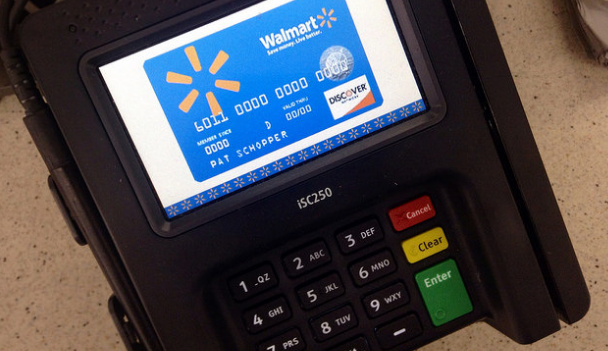Walmart Executive: Chip-And-Signature Credit Cards Not Enough To Protect Consumers
The long-awaited move from traditional magnetic stripe credit cards to cards equipped with computer chips has been touted as a safer, more secure method of payment for consumers. But a top executives at the country’s largest retailers says all the hype surrounding the new cards will likely be a security letdown without the use of PIN requirements.
CNN reports that an executive in charge of payments at Walmart believes the move to signature and chip-enabled cards won’t provide the needed security measures that consumers are expecting.
Mike Cook, assistant treasurer and senior vice president at Walmart, told attendees at the Electronic Transaction Association’s Transact conference this week that so-called chip-and-signature credit cards don’t go far enough to protect consumers from thieves.
Instead, he said Walmart would have preferred that banks implement a chip-and-PIN system.
“Signature is worthless as a form of authentication,” Cook said at the conference. “If you look at the Target and Home Depot breaches … not a single PIN debit card needed to be reissued in those breaches. The card number was worthless to the individual thief and fraudsters, because they didn’t know the PIN.”
Under the chip-and-PIN system, also known as EVM, consumers use a smartcard embedded with a microchip and provide their PIN to complete a transaction. The chips make reproducing a card difficult for criminals. Even if the credit card information is gathered, without the chip the card is useless.
In contrast, chip-and-signature cards, which would still be difficult to reproduce, lack the extra safeguard of a PIN requirement.
Previously, the largest credit issuers – Visa and Mastercard – announced they would rollout chip-and-PIN cards by the end of 2015. However, that time frame was recently changed to the end of 2017.
Still, the credit card companies say that adding the chip aspect of the cards is tackling the biggest fraud issue head-on.
Part of the reluctance in moving toward a PIN method has to do with the costs and short-life spans of such programs with the onslaught of tap-to-pay systems.
“We don’t see a need for it,” Stephanie Ericksen, Visa vice president of risk products says. “[Chip-and-PIN] will have a shorter shelf life. We’re moving to new technologies and innovation.”
Additionally, banks have been reluctant to move forward with the PIN safeguard because of the cost associated with the special numbers. CNN reports that PIN numbers require millions of dollars worth of software upgrades.
For it’s part, Walmart has already been busy installing technology needed to process chip payment cards.
Walmart apparently isn’t alone in its disappointment in a lack of PIN usage. CNN reports that that other retailers have called the move a half-step in the right direction.
Wal-Mart exec: Credit card upgrade a ‘joke’ [CNN]
Want more consumer news? Visit our parent organization, Consumer Reports, for the latest on scams, recalls, and other consumer issues.


